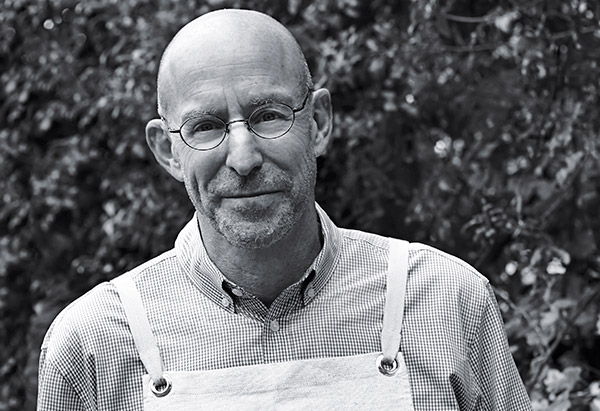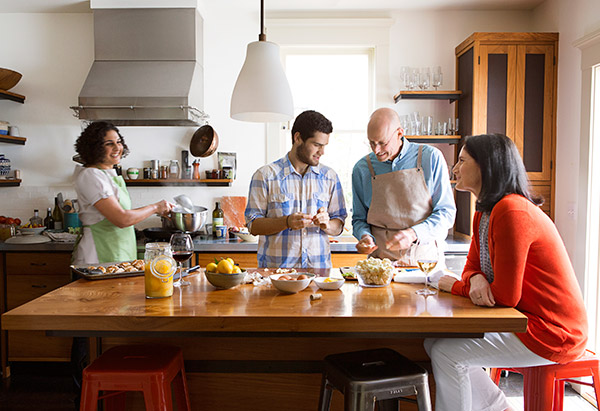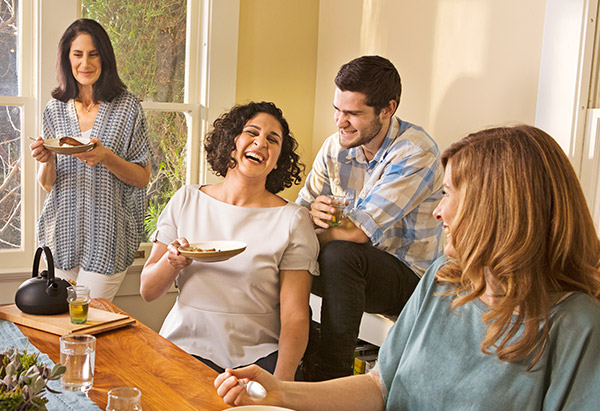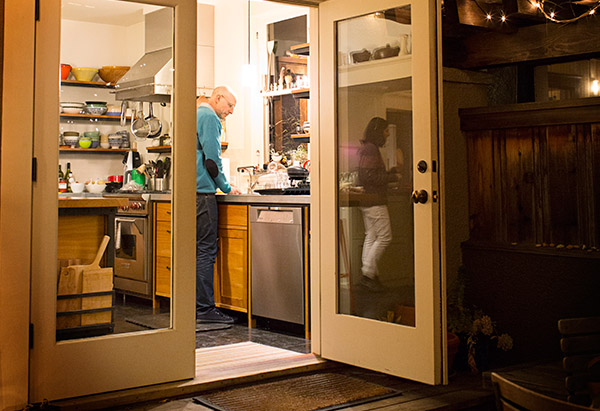
Photo: Coral Von Zumwalt
For years writer Michael Pollan has told us what to put on our plates. ("Eat food. Not too much. Mostly plants," he famously wrote.) Now he's learning what cooking is really all about: slowing down, enjoying the process, and filling the kitchen with family and friends.
On this crisp Bay Area afternoon, in his warm, bright kitchen, writer Michael Pollan is mincing shallots with great concentration—he's still slightly hesitant with a knife—as chef Samin Nosrat, a former journalism student of Pollan's at UC Berkeley, tends to a nearby pan of kale. "Samin's going to tell me to keep chopping these," Pollan says forlornly. "She always wants the shallots smaller." Sure enough, Nosrat asks him to try again, and Pollan—tall, lanky, with an easy smile and the kind of bracing intellect that makes even small talk invigorating—gamely dives back in. Tonight a few of his friends are stopping by for dinner, and he's eager to show off some new talents: Several years after establishing himself as the preeminent observer of how we eat, Michael Pollan is learning what it really means to cook.
In his best-selling books The Omnivore's Dilemma, In Defense of Food, and Food Rules, and as a consultant on the eye-opening documentary Food, Inc., Pollan, 58, has deconstructed the economic and cultural systems that influence what we eat every day, asserting that much of our food isn't food at all but a highly processed mélange of what he calls "edible, foodlike substances" often loaded with sugar, salt, fat, and chemicals. He's railed against policies that allow processed food to be priced far cheaper than healthier fare ("We've made it rational to eat badly") and helped expose the deplorable practices of most industrial meat, grain, and dairy farms. He's the guy who taught us to shop the perimeter of the supermarket, to stop eating when we're four-fifths full, to avoid consuming products with long lists of ingredients we can't pronounce.
Still, Pollan says his idea of dinner has often involved little more than throwing a steak on the grill, boiling up some packaged ravioli or heading to a restaurant. "I took cooking for granted," he admits, though he comes from a cooking family: His mother, a confirmed gourmet, is currently at work on a cookbook with his three sisters.
A few years ago, Pollan decided this gap in his knowledge needed to be addressed. "I started to realize that cooking might be the most important factor in fixing our public health crisis," he says. "People who cook eat healthier diets. And this whole renaissance of farmers' markets and community supported agriculture that's going on right now—these are economies we should support, and they depend on cooking. It was the missing link I needed to explore."
Next: Cooking connects you to plants, animals, nature and to other people

Photo: Coral Von Zumwalt
Prep School: The dinner crew (from left, Samin Nosrat, Isaac Pollan, Michael Pollan, and Judith Belzer) chop, roast, and sauté their way through the evening's menu.
Pollan's new book, Cooked: A Natural History of Transformation, chronicles the ensuing three years of study, during which he worked with breadmakers, barbecue masters, professional chefs (including Nosrat, who spent many Sunday afternoons instructing Pollan at his home), and a cheese-making nun—all with the aim of better understanding and appreciating the alchemy that turns ingredients into meals. The result is a graceful blend of philosophy, history, and science that's as much about Pollan's delight in discovering delicious new skills as it is about the social and cultural benefits of homemade food. "This is the story of one person learning how to do things he didn't know how to do," Pollan explains.
He's still learning, of course, so tonight he has a backup crew for support. As Pollan continues to chop, Nosrat blanches and roasts the components of a hearty salad of beets, cauliflower, and leeks. They work near the French doors that lead to the garden (Pollan grows kale, runner beans, and zucchini), in which a fire pit serves as the focal point of Pollan's annual neighborhood pig roast. The party is always well attended. "Cooking connects," he explains. "It connects you to plants and animals and fungi, to nature and your community—but it especially connects you to other people."
As the evening's meal takes shape, Pollan's wife, Judith Belzer, an artist, and their college-student son, Isaac, join them in the kitchen, and the quartet reminisce about a few of Pollan's culinary disasters, like the mysteriously grainy chocolate pudding he attempted, or the coq au vin that he and Nosrat made with a rooster so fresh it had rigor mortis. ("The meat never did relax," he laments.)
But his setbacks have been far outweighed by his successes. Pollan says he's come to view the act of cooking as almost magical. "There's this primal fascination in witnessing the transformation of ingredients into food," he says, "which many of us first experienced as kids. I remember in fifth grade I watched someone scramble eggs. This yellow slime became these fluffy golden nuggets. It was pretty amazing. One of the great things about cooking is that it engages all your senses—it's a more central experience than we typically get in a culture so obsessed with staring at screens."
Next: Even a novice can make food that's far better than a frozen dinner
Pollan's new book, Cooked: A Natural History of Transformation, chronicles the ensuing three years of study, during which he worked with breadmakers, barbecue masters, professional chefs (including Nosrat, who spent many Sunday afternoons instructing Pollan at his home), and a cheese-making nun—all with the aim of better understanding and appreciating the alchemy that turns ingredients into meals. The result is a graceful blend of philosophy, history, and science that's as much about Pollan's delight in discovering delicious new skills as it is about the social and cultural benefits of homemade food. "This is the story of one person learning how to do things he didn't know how to do," Pollan explains.
He's still learning, of course, so tonight he has a backup crew for support. As Pollan continues to chop, Nosrat blanches and roasts the components of a hearty salad of beets, cauliflower, and leeks. They work near the French doors that lead to the garden (Pollan grows kale, runner beans, and zucchini), in which a fire pit serves as the focal point of Pollan's annual neighborhood pig roast. The party is always well attended. "Cooking connects," he explains. "It connects you to plants and animals and fungi, to nature and your community—but it especially connects you to other people."
As the evening's meal takes shape, Pollan's wife, Judith Belzer, an artist, and their college-student son, Isaac, join them in the kitchen, and the quartet reminisce about a few of Pollan's culinary disasters, like the mysteriously grainy chocolate pudding he attempted, or the coq au vin that he and Nosrat made with a rooster so fresh it had rigor mortis. ("The meat never did relax," he laments.)
But his setbacks have been far outweighed by his successes. Pollan says he's come to view the act of cooking as almost magical. "There's this primal fascination in witnessing the transformation of ingredients into food," he says, "which many of us first experienced as kids. I remember in fifth grade I watched someone scramble eggs. This yellow slime became these fluffy golden nuggets. It was pretty amazing. One of the great things about cooking is that it engages all your senses—it's a more central experience than we typically get in a culture so obsessed with staring at screens."
Next: Even a novice can make food that's far better than a frozen dinner

Photo: Coral Von Zumwalt
Service with a smile: In the Pollan house, dinner is all about laughing, unwinding—and cooking—with good friends.
As Pollan's guests—all former students turned friends—arrive, they head instinctively for the kitchen, which is anchored by an island made from a slab of salvaged elm. "Whenever we entertain, we try to get people to gather in the living room for appetizers," Pollan says, "but they always end up gravitating toward here." While the cooking continues, the group enjoys canapés of Dungeness crab with preserved lemon and dill, someone spots a photo of a younger, impressively bearded Pollan in a straw hat ("I was in Mexico!" he protests), and the house begins to fill with the intoxicating, zingy fragrance of the main course: a vinegar-braised chicken.
The cooking of the meal isn't particularly quick, but considering its quality, it takes less time and effort than you might expect—a lesson that surprised him, says Pollan, and that he hopes to share with readers. "People might ask, 'How am I supposed to fit more kitchen time into my day?'" he says, pointing out research that shows Americans today, on average, spend about half the time preparing food that they did in the '60s. "But part of it has to do with how we've come to think about leisure. For some reason we've defined it as passive consumption, and we've learned to think of cooking as hard work. It's not hard. Even a novice can make food that's far better than a frozen dinner. And cooking is the best thing you can do for the health and well-being of your family." Friends, too: As everyone sits down at the table, it's clear that Pollan's hypothesis about the social nature of dining is well founded.
The chicken is deliciously tangy and vibrant, and the vegetable salad is simultaneously refreshing and rich. By the time Pollan brings out dessert—roasted pears with ricotta, honey, and black pepper—everyone looks happy, and perhaps slightly more than four-fifths full.
Next: How cooking can be a spiritual thing
As Pollan's guests—all former students turned friends—arrive, they head instinctively for the kitchen, which is anchored by an island made from a slab of salvaged elm. "Whenever we entertain, we try to get people to gather in the living room for appetizers," Pollan says, "but they always end up gravitating toward here." While the cooking continues, the group enjoys canapés of Dungeness crab with preserved lemon and dill, someone spots a photo of a younger, impressively bearded Pollan in a straw hat ("I was in Mexico!" he protests), and the house begins to fill with the intoxicating, zingy fragrance of the main course: a vinegar-braised chicken.
The cooking of the meal isn't particularly quick, but considering its quality, it takes less time and effort than you might expect—a lesson that surprised him, says Pollan, and that he hopes to share with readers. "People might ask, 'How am I supposed to fit more kitchen time into my day?'" he says, pointing out research that shows Americans today, on average, spend about half the time preparing food that they did in the '60s. "But part of it has to do with how we've come to think about leisure. For some reason we've defined it as passive consumption, and we've learned to think of cooking as hard work. It's not hard. Even a novice can make food that's far better than a frozen dinner. And cooking is the best thing you can do for the health and well-being of your family." Friends, too: As everyone sits down at the table, it's clear that Pollan's hypothesis about the social nature of dining is well founded.
The chicken is deliciously tangy and vibrant, and the vegetable salad is simultaneously refreshing and rich. By the time Pollan brings out dessert—roasted pears with ricotta, honey, and black pepper—everyone looks happy, and perhaps slightly more than four-fifths full.
Next: How cooking can be a spiritual thing

Photo: Coral Von Zumwalt
Pollan says that learning to be a better cook has changed his life in ways he didn't expect. He has bonded with Isaac over homemade beer (they have a carboy of home brew bubbling in the basement), he eats out less often (on nights when she's been away, Judith says, she sometimes comes home to find Pollan eating a three-course meal he's made just for himself), and, perhaps most surprisingly, he has come to view the aspects of food preparation that used to seem like a chore as calming, grounding, and sometimes even meditative. "Cooking is how we transform nature into culture," he says. "It's a really profound thing—a spiritual thing. For me, transcending this idea that it's drudgery is important."
Pollan laughs. "So when I realized it was possible for me to enjoy chopping onions, I knew I'd passed over into a different place."
Catherine Price is the author of 101 Places Not to See Before You Die (Harper Perennial).
Vibrant Recipes from Michael Pollan's Kitchen




